- Details
On November 13th the first online event entitled "Gadz Stories #1" took place. The event was dedicated to aerospace and the role of Data Science and AI in this field.
We would like to thank our speakers - Dr. Ryan Alimo and Sacha Ghebali (Bo 211) - for sharing their experience working in this promising sector.
More about the speakers:
- Dr. Sacha Ghebali (Bo 211)
Sacha studied at Arts et Metiers in Bordeaux, then completed the Research Master in Fluid Mechanics in Paris and went on to pursue a PhD in Aeronautics at Imperial College London with a studentship from Airbus and Innovate UK. His research focused on turbulence and optimizing wall geometries to reduce the turbulent drag.
Sacha carried out research for Safran on propeller performance for contra-rotating propellers (CROR) and for Swiss Space Systems at the von Karman Institute for Fluid Dynamics where he undertook experimental studies on the interaction between the carrier aircraft and the space shuttle in low-speed conditions.
Sacha collaborated with Dr. Alimo during his PhD at UCSD on using non-convex derivative-free optimization methods in order to maximize the turbulent drag reduction obtained by a passive alteration of a flat surface via interaction with the near-wall turbulent activity. We will get a chance to touch on this during the event.
After completing his PhD, Sacha went on to work as an early employee at Monolith AI, a company working on building AI assistants for complex design problems. He then completed a business degree at MIT and is now working in crypto currencies at an early stage company.
- Dr. Ryan Alimo
Ryan Alimo is a lead data scientist at NASA's Jet Propulsion Laboratory (JPL), California Institute of Technology's deep learning group. His primary research interests span theory and practice of nonconvex optimization for machine learning for autonomous spacecraft systems, and he is advancing the field of human-AI teaming and multi-agent systems. In particular, he has been working on developing and analyzing deep learning algorithms for teams of robots and humans, which can cooperate to form virtual structures and networks and perform distributed measurements and computation that is usually not possible with a single robot or a human operator. His work enables new capabilities in deep space explorations for NASA in the areas of spacecraft formation flying, automation of deep space communication (DSN) network, and automation of the Curiosity Mars rover's ground data system.
Prior to NASA's JPL, Dr. Alimo worked as a Postdoctoral Fellow at the Caltech’s Center for Autonomous Systems and Technology (CAST), working on the autonomy of flying cars and spacecraft formation flying. He received the Ph.D. degree in Computational Science from the University of California, San Diego (UCSD), and the B.Sc. degree in Computational Mechanics from Sharif University of Technology (STU). Dr. Alimo was awarded the NASA's JPL Voyager Award in 2019 & 2020 for his work in integrating novel optimization algorithms with deep learning models to develop autonomous spacecraft, was a nominee for Forbes 30 under 30 2020 in science, awarded UCSD's outstanding graduate student award in 2017, and awarded gold medalist of the 2005 national astronomy Olympiad.
In addition to his machine learning research at NASA, Dr. Alimo is getting his MBA degree from the University of California, Los Angeles. He also founded a technology startup company, OPAL AI INC, that develops augmented intelligence (AI) software to automate labor-intensive tasks leveraging commercially-off-the-shelf (COTS) hardware.
We are looking forward to the news events "Gadz Stories" organized by AFAM!
Useful links:
To sign up for AFAM monthly newsletter: here
Turbulent drag reduction by oblique wavy wall undulations (By Sacha Ghebali): https://spiral.imperial.ac.uk/handle/10044/1/63827
https://mars.nasa.gov/mars2020/- we will have Mars Rover landing on Mars in less than 100 days!
Deep Space Network - https://eyes.nasa.gov/dsn/dsn.html
A derivative-free optimization algorithm for the efficient minimization of functions obtained via statistical averaging (by Ryan Alimo and others): https://arxiv.org/pdf/1910.12393.pdf
Tuning a variational autoencoder for data accountability problem in the Mars Science Laboratory ground data system (by Ryan Alimo and others): https://arxiv.org/pdf/2006.03962.pdf
https://scienceandtechnology.jpl.nasa.gov/research/strategic-technologies
Computer vision application: https://arxiv.org/pdf/2001.10673
For new research works follow Dr. Alimo at: https://twitter.com/RyanAlimo
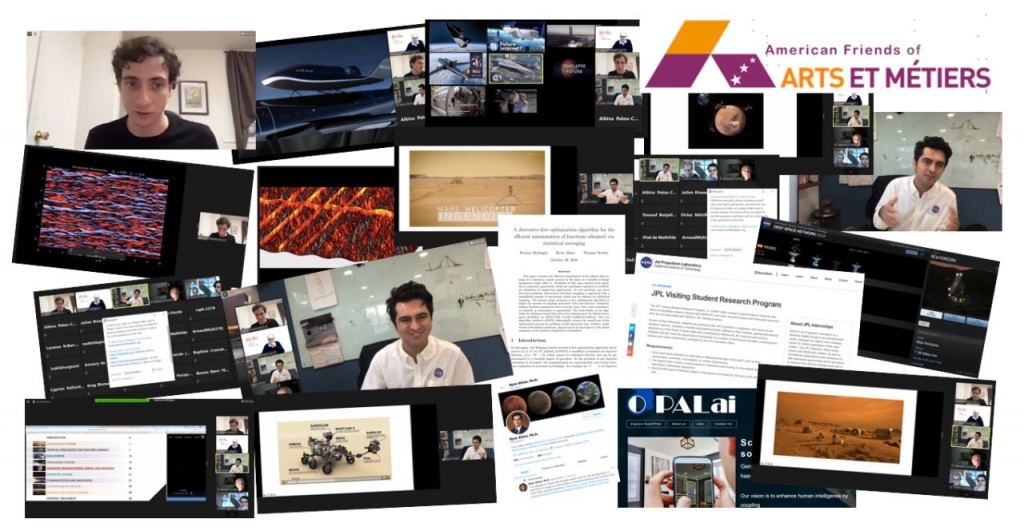
- Details
"Réveille ton étoile" is a live seminaire organized by la SOCE, East Coast group and gadzarts group in Canada.
It took place on October 31th.
The goal of this workshop was to think about your professional development and to get ready for a new chapter of your professional life.
Thank you to Marc Pavageau (la SOCE), Baptiste Gauthier (gadzarts group of Canada) and Sacha Ghebali (East Coast group president) for organizing!
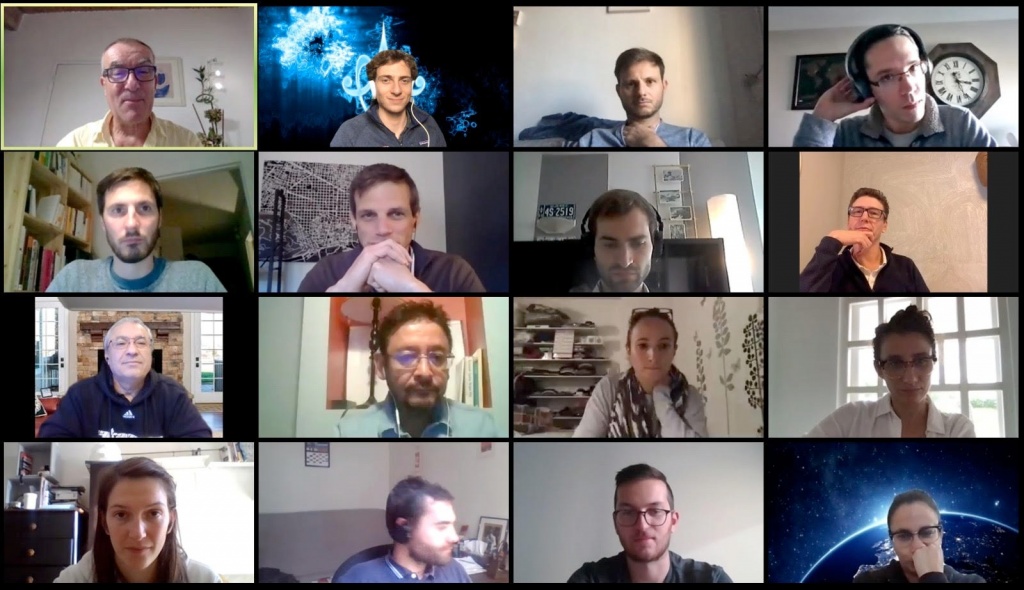
- Details
What is mentorship? Our Mentors shared some thoughts on what mentorship is.
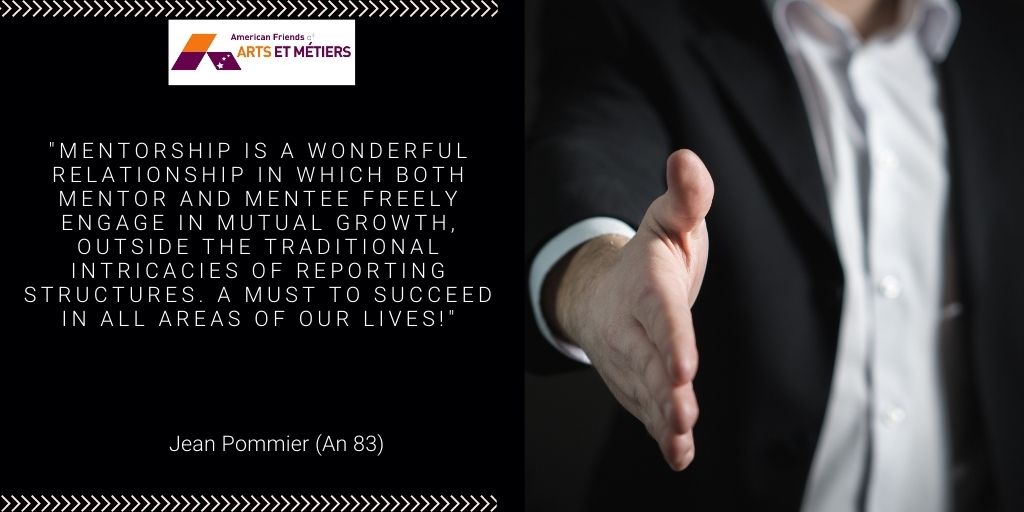
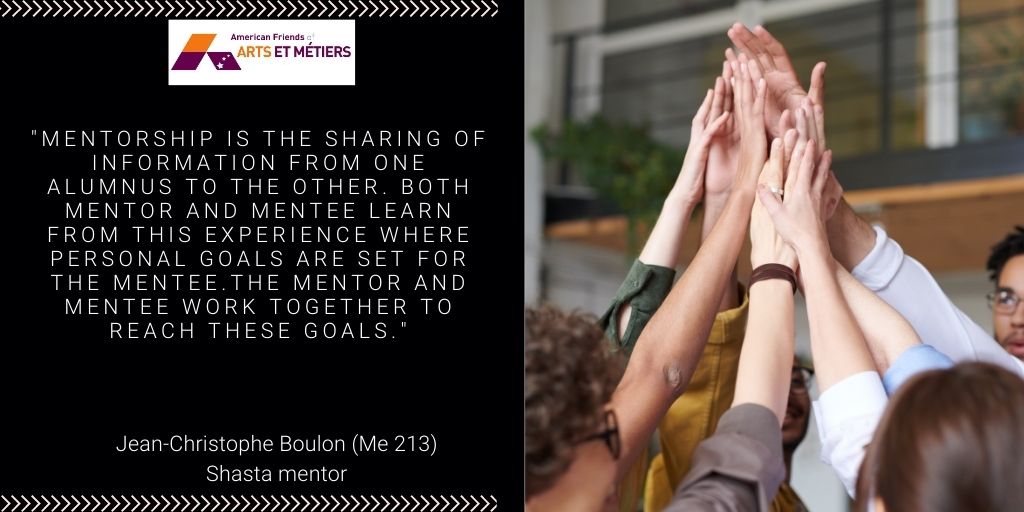
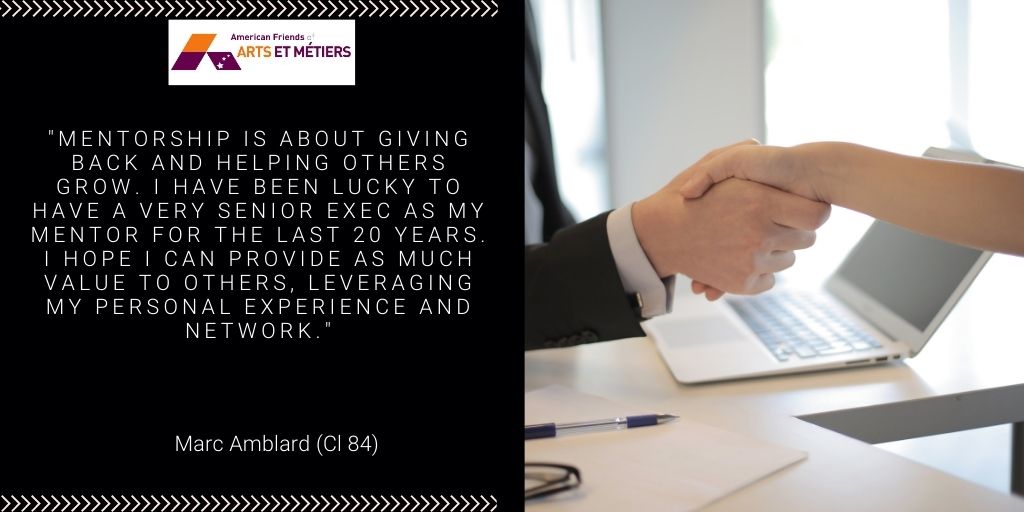
- Details
On the occasion of our Shasta Month, we decided to collect some testimonials from our Shasta students.
What does Shasta program and mentorship mean for our students?
Jules Ehrbar (Me 216): “My mentor helped me find good start-ups or companies which could hire me. Positive aspects of this mentorship were his experience of being an expat in the US for long years and his knowledge of the American employment market.”
Omar Najid (Bo 217): “SHASTA program is a good opportunity for young engineering students to widen their network and build an international project abroad. AFAM provided me assistance in my internship search and in adapting my CV to the American standards, so I was able to apply for any opportunity within US with a good apprehension of the expectations. Getting an internship in the US is challenging but with AFAM’s help the process is intelligible and the international experience you have always been dreaming of is much more attainable"
Antoine Gurtler (Bo 217): “I had to do my 6-month internship between July 2019 and February 2020. Highly motivated working in aeronautics and traveling around the world, I had set such a target as find an internship in the US. I contacted the AFAM and particularly Albina Patou-Chebykina explaining my project. The AFAM helped me and advised me in my internship search allowing me joining the Shasta program. I have had Jean-Christophe Boulon as a mentor, an Arts et Métiers engineer working at Safran in California. After four hard working months, I managed to get a 6-month internship at Dassault Falcon Jet Little Rock, Arkansas. I was involved in the Tooling Engineering team and responsible to design aeronautics tools (Catia V5) to support the production. I managed the projects for its life cycle including determine the real need, study the concept, design a tool to match the requirements and make the delivery. Before going to Little Rock, I made an application for a financial aid from The AFAM and the association gave me a $2000 grant and $2000 loan allowing me starting my life in Little Rock buying a car for example. I would like to thank the AFAM for everything. By the way I would like to come back to the US finding a one-year VIE in New York City.”
Jordan Mbeleg (Li 216): “I am very appreciative of the mentoring offered to me by Yacine (mentor) and Albina (AFAM community manager) through the Shasta Program. Thanks to them, my mindset on how to apprehend the US job market has drastically changed. I am confident that I will be able to secure a Full-time job in the US next year after my graduation at Georgia Tech. Go Shasta!”
Sébastien Sequeira (Bo 216): “As I had been selected for Georgia Tech dual degree with Arts et Métier, I wanted this academic experience to be enhanced with an internship in the US. However I had no contact within the US at all. Thus, I started to email heads of international studies at Arts et Métiers administration who eventually led me to Albina Patou and after several discussions with her, I finally obtained my mentor, Jean Pommier. He helped me a lot defining my objectives since I had no fixed professional project. I worked with him for my motivation letters. He gave me different advises which helps me have an insight of American demands regarding internships. Moreover, he reached out some friends from different companies I had apply to, especially Tesla. Even though it doesn’t work for me, I am really grateful for his support. It made me learn a lot about myself, how to highlight my advantages and how to adapt my applications to different fields and type of companies. Now that I have a better idea of American companies’ expectations, I will try again to find an internship in January 2021. I would like to thank Albina as well, since she spent a lot of time to help me improve my resume and get some contacts in different companies. She is always eager to push me and find new opportunities.”
Marius Moreira (Bo 216): “I would like to thank a lot the AFAM for the support I received during this tricky phase of internship search. Mrs. Patou was really available to answers my interrogations, she gave me real valuable advices. Thanks to my participation to this program, I know now a lot on recruitment process in the US, and I will be well trained if I want to apply again in the coming months or years.”
Saint Just Adhémar (Cl 218): “SHASTA helped me a lot to understand the American system and to adapt my applications.”
Salim Gaci ( Li 217): "My mentor was really available, eager to help and benevolent.”
To be a part of our Shasta program, please
- Details
October is internatioanl month at Arts et Metiers. To celebrate it, an article about AFAM has been published in internal Arts et Metiers magazine "Inside Arts et Metiers":
- Financial Engineering: interview #4 with Jean-Baptiste Commans (Li 203), Strategist and Data Scientist at JPMorgan Chase and Co
- First meeting in NYC after the lock down
- Financial Engineering: Interview #3 with with Imane Sanhaji (Cl 211)
- Financial Engineering: Interview #2 with Jean-Rodolphe Guis (Bo 99), Deputy Head inspection Générale Global Markets & ALMT, BNP Paribas
- Financial Engineering: building the new world. Interview #1 with Sacha Ghebali (Bo 211), Product Manager at Kaiko

 BLOG /
BLOG /  CALENDAR /
CALENDAR /  DONATIONS /
DONATIONS /  MENTORS /
MENTORS /